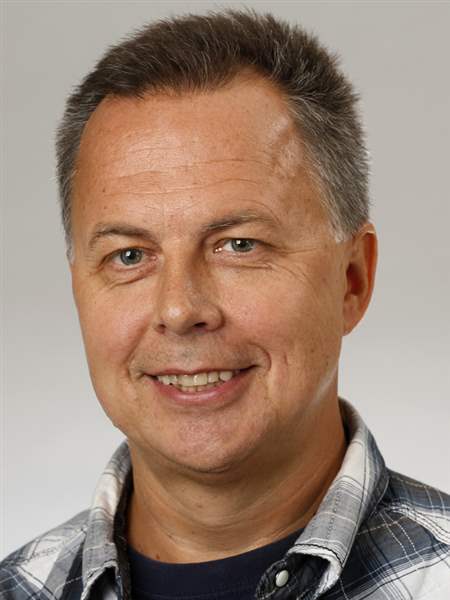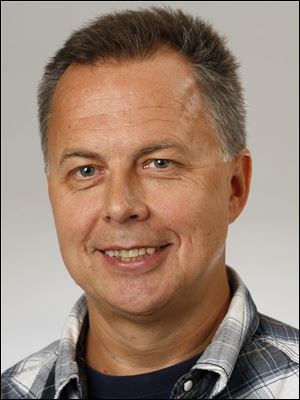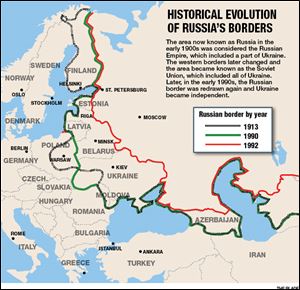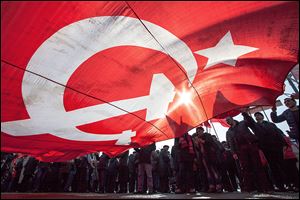
COMMENTARY
Putin’s new empire
After Crimea, will Russia pursue on more land grabs?
3/23/2014
Sigov
The Blade
Buy This Image

Sigov
Russian President Vladimir Putin announced Wednesday that the annexation of Crimea last week reversed what he described as a “historic mistake” by the Soviet Union 60 years ago.
In an hour-long televised speech to Russia’s political elite, he called Kiev — the capital of Ukraine — “the mother of all Russian cities,” borrowing the phrase from Soviet-era history school books.
The fact that Mr. Putin has not admitted that the annexation of Crimea followed a Russian invasion of Ukraine does not render credibility to any of his public pronouncements. Neither do his references to the Russian invading force as “Crimean self-defense units” or his calling illegal decisions by the Crimean parliament to split Crimea from Ukraine and a public vote to join Russia “self determination of the people of Crimea.”
But Mr. Putin’s position as the de-facto dictator of the world’s largest country that boasts nuclear weapons parity with the United States, makes such “historic” references ominous enough and may indicate his commitment to continue the land grab to other parts of Ukraine — including Kiev. But his goal may be a quest to restore Russia to the borders of the former Soviet Union that included the Baltic states, if not to the borders of an the even larger former Russian Empire that included Finland and part of Poland.
His references are in fact a sham, a spin on the events that happened in Russia’s and Ukraine’s shared past, meant to justify his effort to rebuild the empire or at least to create an appearance of such an effort, upon which he has all but staked his kleptocratic career and his quest to remain Russia’s leader for life.

History lesson
The history of Crimea, Ukraine, and Russia do not support Mr. Putin’s statements over the past week.
Crimea — a peninsula on the Black Sea — was first annexed by the Russian Empire in 1783 after Russia used its military to seize it from Ottoman Empire that for four centuries had owned that Russia-coveted portal to the Mediterranean Sea, which serves as a route to the Atlantic Ocean
After the 1917 communist revolt and during the ensuing civil war in Russia, the Crimean Autonomous Soviet Socialist Republic was created in 1921 only to be dissolved and become part of Russia proper in 1945, a year after Joseph Stalin deported to central Asia the indigenous, predominantly Muslim population of Crimean Tatars, who have lived there since the Middle Ages, replacing them with ethnic Russian settlers.
Mr. Putin's “historic mistake” reference is in regard to former Soviet leader Nikita Khrushchev’s 1954 decision to give Crimea to Ukraine — then a Soviet republic. The gift is widely believed to be a gesture of goodwill from Mr. Khrushchev, whose wife, Nina, was from western Ukraine. Kremlin insiders always considered it a gift to his wife.
At the time, it did not mean much because it remained a part of the Kremlin-controlled Soviet Union, but that decision became significant when Crimea — including Sevastopol, the home of the Russian Black Sea Fleet — became part of an independent Ukraine after the USSR fell apart in 1991.

Russian President Vladimir Putin signs bills making Crimea part of Russia.
The Tatar factor
One may rightfully argue that Mr. Khrushchev’s mistake was not giving the peninsula to Ukraine, but in not allowing the Crimean Tatars to return. The descendants of the deported Crimean Tatars started returning to the peninsula after Mikhail Gorbachev took over as the Soviet leader in 1985, with most of them moving back to Crimea after 1991.
Crimean Tatars now account for only 12 percent of Crimea’s population of about 2.3 million, with about 60 percent of the current Crimean population ethnic Russians and about 25 percent ethnic Ukrainians.
True, the majority of those who voted in the Crimean referendum may have voted in favor of joining Russia, especially in the presence of Russian military. But that was a result of ethnic cleansing that was perpetrated by Stalin and that Mr. Putin obviously and tellingly considers no mistake at all — not even after the ethnic cleansing of Kosovar Albanians committed by Serbian forces in Kosovo in 1999.

Russian Communist party supporters carry a huge former Soviet Union flag during a rally in support of Crimea joining Russia near Red Square in Moscow.
Controlling Ukraine
As to Mr. Putin’s reference to Kiev as “mat gorodov russkikh,” or “Mother of all Russian cities,” Ukrainians would be just as justified — if not more justified — in claiming that Kyiv (as the name of the city is spelled in Ukrainian) is primarily the mother of all Ukrainian cities.
One of Eastern Europe's oldest cities, Kiev likely dates to an early-Slavic settlement that formed in the 5th century, about four centuries before it became the capital in the late 9th century of Kievan Rus' — a loose federation of Slavic tribes — that was established by the vikings.
Moscow formed as a city in the 12th century. In 1327, it became the capital of an independent principality that united Vladimir and Suzdal — two cities about a hundred miles east of Moscow. Then from the late 13th to the late 15th century, Russia, including Moscow, was under Tatar control, with Moscow becoming the capital of Russia in the late 15th century after the Russians freed themselves from the Tatars.
Unlike Russia, Ukraine formed and existed as a powerful nation in the Middle Ages.
In the 12th century — ironically about the time Moscow was formed — Ukraine fell apart, with its present day territories ruled by the Tatars, Lithuania, and Poland. Poland fought for and took over all those territories during the 15th century, but in 1653 the majority of Ukrainians rebelled, coming under Russia’s control.
In the 18th century, partitions of Ukraine followed, dividing Ukraine between Russia and Austria, with most of Ukraine — eastern and central Ukraine — going to the Russian Empire. After the 1917 Bolshevik revolt in St. Petersburg and Moscow, the Red Army fought and established control over the former empire’s Ukrainian territory in late 1919.
What followed were mass repressions and a genocide of Ukrainians, with millions of people starved to death in 1932 and 1933 in a famine organized by the Stalin regime. One has to be really determined to ignore the truth, which was what the late New York Times reporter Walter Duranty did to win a 1932 Pulitzer Prize for his pro-Stalin coverage of Russia.
After a 1939 coordinated invasion of Poland by Nazi Germany and the Soviet Union, the USSR annexed the western Ukrainian territories under Polish control. The Soviets also annexed the Baltic states of Latvia, Estonia, and Lithuania as a result of a secret pact with Nazi Germany.
It is doubtful that Mr. Putin has evolved as an empire builder over his 14 years in power. He has been one since the very beginning when he sent troops to Chechnya and continued to be one when he ordered an invasion of Georgia in 2008.
Mr. Putin remained true to himself when he ordered a much riskier invasion of Ukraine — a country of 45 million people in the center of Europe. The ex-KGB operative simply figures he can afford this land grab as he rides a wave of populism and anti-Americanism in the aftermath of a decade-old effort of strengthening his hold of the kleptocratic regime while subjugating the opposition, the judiciary, and the media.
The road ahead
To be sure, President Obama was right when he said that nobody wants a war with Russia — not over Ukraine, where the United States does not have direct interests.
But NATO-member countries such Poland, the Baltic states, and Finland are another matter.
Vice President Joe Biden was right in making it clear to Mr. Putin in a speech Wednesday in Lithuania that the United States views the commitment of NATO members to defend a member country against aggression “very seriously.”
Just before getting fired for speaking his mind in a publication against the Ukrainian invasion, professor Andrey Zubov, a leading Russian historian, warned that Russia had brought itself to the “brink of a cold or, possibly, a hot war” with Europe and the United States.
Mr. Zubov — who taught history at the elite Moscow State Institute of International Relations where Russian diplomats, economists, jurists, and journalists are trained — was right. The history professor was one of many representatives of Russia’s elite humanitarian scientists and educators who have been fired or have quit and fled the country over the past year.
Mr. Putin has been tightening the screws while preparing his propaganda machine for the aggression in the Crimea.
And the fact that Russia’s diplomats and propagandists now make do with Mr. Putin’s skewed view of events is very bad news — for pretty much everybody, including themselves. Just like their colleagues in Nazi Germany, who used to operate based on the views of the late propaganda Reich Minister Joseph Goebbels — they may also come to a sorry end.
In the face of the Russian aggression in Europe, the United States has no choice now but draw a thick red line along the eastern borders of Poland, Finland, and the Baltic states — by buffing up their militaries and boosting the missile defense system both in Europe and elsewhere — so as to leave Mr. Putin no doubt that crossing that line would be suicidal.
History teaches us that the Cold War has worked to prevent a hot war that likely would have resulted in a guaranteed mutual nuclear annihilation of Russia and the United States. It is likely to work again, especially against a lesser enemy.
Mike Sigov, a former Russian journalist in Moscow, is a U.S. citizen and a staff writer for The Blade.
Contact Mike Sigov at: sigov@theblade.com, 419-724-6089, or on Twitter @mikesigovblade.